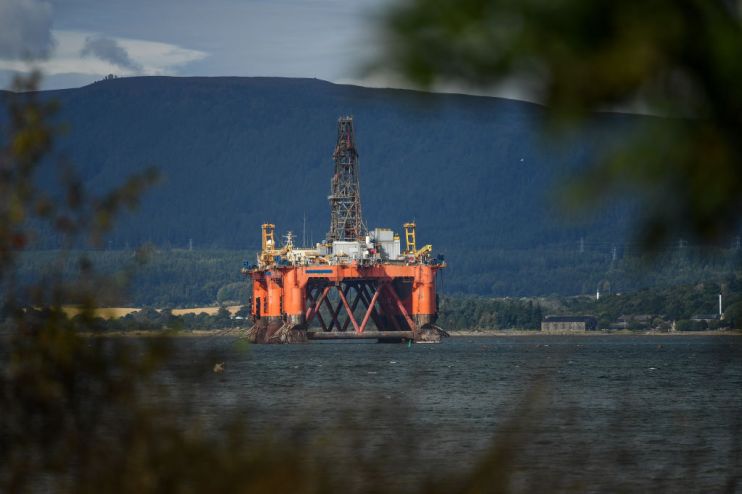Approving Rosebank oil and gas field ‘a huge mistake’, government told

Climate groups have urged the government not to approve the Rosebank project, one of the largest undeveloped oil and gas fields in the North Sea.
This follows warnings from campaign group Uplift that the projected emissions from producing oil at Rosebank alone would be enough to exceed the share of the UK’s carbon budgets that should come from oil and gas production from 2028 onwards.
Activists are raising concerns over its potential carbon emissions and questioning whether it would have any effect on easing record household energy bills.
Charlie Kronick, senior climate advisor for Greenpeace UK, told City A.M. greenlighting the development would be a “huge mistake” as it would “blow the UK’s carbon budget, seriously undermining the climate as well as our legal commitment to net zero”.
Commenting on the commercial realities of the project, he said: “Like 80 per cent of all North Sea oil, the majority of Rosebank’s production will likely be exported and then sold back to us – doing nothing to help energy security.
“The profits will then go to the oil and gas companies that own Rosebank’s reserves, including Equinor. Equinor already pays an overall tax rate of 78 per cent at home in Norway. Why should they pay a lower rate in the UK?”
Fiona Duggan, policy lead at climate charity Ashden, called on the government to ditch investment relief in the windfall tax to make such projects less viable for oil and gas companies.
She said: “If the government wants to help consumers reduce their bills, it makes no sense to give tax breaks to fossil fuel companies to open new oil fields in the North Sea. It is a terrible waste of taxpayer funds when we know that any oil and gas that is produced in UK waters gets sold at international market prices.”
These comments follow shadow climate secretary Ed Miliband’s criticism of Rosebank; he argued the development would not drive down bills.
The frontbencher confirmed there would be no more licensing rounds for fossil fuel projects under a Labour government.
He said: “I don’t believe in new licences for oil and gas and I’ll tell you why: they won’t cut bills by a penny, even by the government’s own admission. The truth is that they’ve got to spend massive amounts of money to get the industry to invest in this.”
As an alternative to Rosebank, both Greenpeace and Ashden have urged the government to ramp up energy efficiency measures instead.
Kronick said: “The only ways we’re going to address the interlocking climate, cost of living and energy crises are to invest in insulating our leaky buildings, invest in cheap reliable renewable energy and upgrade our outdated energy grid. We need to end our dependence on oil and gas once and for all, not drill for more.”
“This money would be far better spent retrofitting the UK’s 19m homes. This would not only help reduce current eye-watering energy bills but also help create thousands of green new jobs, as well as helping tackle the climate crisis,” Duggan added.
The UK has some of the least energy efficient housing stock in Europe, and the government has pledged around £13bn on energy efficiency packages.
It is targeting a 15 per cent reduction in energy usage and wants all homes to have an energy performance certificate rating of C or above.”
However, much of this funding does not kick in until the next parliament, while installation rates for insulation have flatlined over the past decade.
Rosebank project awaits approval
Rosebank, which is owned by Norwegian fossil fuel giant Equinor and domestic operator Ithaca Energy, has the potential to produce up to 500m barrels of oil – roughly equivalent to eight per cent of the UK’s entire oil output between 2026 and 2030.
The Offshore Petroleum Regulator for Environment and Decommissioning (OPRED) is currently reviewing Rosebank’s environmental statement. After this, the North Sea Transition Authority will audit the project’s field development plan.
It is energy security secretary Grant Shapps who will make the final investment decision.
The project is widely expected to be approved – and has been backed by Offshore Energies UK.
The government has been holding talks with Ithaca over the project, as first revealed by City A.M., amid concerns the lack of a price floor in the windfall tax makes the development financially challenging.
Oil and gas exploration does feature in the government’s energy security plans, with the UK looking to boost domestic fossil fuel production to reduce its reliance on overseas vendors and meets its energy security targets.
The Climate Change Committee, Westminster’s independent advisory group, predicts half of the UK’s energy requirements between now and 2050 will still need to be met by oil and gas, and as much as 64 per cent of UK energy needs between 2022 and 2037.
With the UK reliant on gas to heat 85 per cent of its housing stock, the North Sea offers the least carbon intensive option – at around 10kg of CO₂ per barrel of oil equivalent, compared to 70kg-plus for fracked gas from US.
When approached for comment, a department for energy security and net zero spokesperson said: “We are on track to deliver our carbon budgets, creating jobs and investment across the UK while reducing emissions. Our carbon budget delivery plan is a dynamic long-term plan for a transition that will take place over the next 15 years, setting us on course to reach net zero by 2050.”